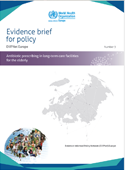Evidence brief for policy. Antibiotic prescribing in long-term care facilities for the elderly (2018)

Download
EVIPNet Europe, Number 3
The Ministry of Health of Slovenia commissioned this evidence brief for policy, to be published under the aegis of the WHO European Evidence-informed Policy Network, to develop evidence-informed options for the country to consider in tackling the problem of prescribing broad-spectrum antibiotics to elderly people in long-term care facilities. Such treatment is taking place without proper diagnosis of infection and microbiological testing, and without indication, choice, dose or duration of therapy, thus representing the key driving factor for antimicrobial resistance. The work was carried out within the framework of the Biennial Collaborative Agreement between the Ministry of Health and WHO, involving high-level national policy institutions and national experts, and supported by the technical experts of WHO Regional Office for Europe. The Slovene National Institute for Public Health convened a working group comprising representatives from the clinical field, pharmacology, public health and health care management. The group identified, selected, appraised and synthesized relevant research evidence on the problem, three options for tackling it and considerations in implementing them. The three options are: surveillance, monitoring and audit/feedback on antibiotic consumption and antimicrobial resistance in long-term care facilities; development and implementation of guidelines and clinical pathways for diagnosing and treating infections; and continuous medical education for health care professionals and provision of health information to residents of long-term care facilities and their relatives /visitors.



